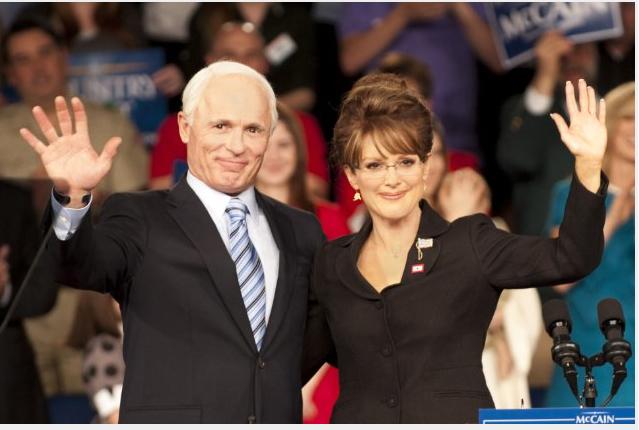‘Game Change,’ Unsettling Some Scores
By • March 15, 2012 0 1037

“Game Change,” the HBO movie about the selection of then virtually unknown Alaska Governor Sarah Palin to be Republican presidential candidate John McCain’s vice-presidential running mate, has come if not gone, leaving behind a certain amount of controversy and some unsettling thoughts.
The movie, based on a much larger account of the 2008 presidential campaign by John Heilemann and Mark Halperin in which the McCain-Palin story was a smallish part. “Game Change” premiered in New York and at Washington’s Newseum, with red-carpet stars like Julianne Moore in attendance (actually, the carpet was blue at the Newseum’s March 8 reception), amid local rehashing of old Palin and McCain campaign tales.
Palin dismissed and trashed the movie without having seen it. That’s too bad, because in reality — if there is such a thing in politics — she comes off as much more of a whole person than one might expect from such efforts. McCain also attacked the filmmakers for their treatment of Palin, being ever the gentleman about his expressions of feeling toward Palin and his choice of Palin as running mate. This way, he also doesn’t have to take responsibility for unleashing Palin’s particular gift for creating disharmony in the body politic.
When all is said and done, however, you’re left with a film that has its own sort of power and manages to be a work that feels like a more-or-less truthful, if slightly fictional account of the Palin’s selection and her subsequent impact on the 2008 election campaign.
Movies about politics and government often don’t fare well. There are few that resonate through the years, although Robert Redford’s “The Candidate” Otto Preminger’s “Advice and Consent,” about a nominee for secretary of state, and Gore Vidal’s “The Best Man,” which is getting a Broadway revival, are terrific examples of the genre.
“Game Change” reminds us more than anything of Mike Nichols’s film version of “Primary Colors,” the thinly disguised, hugely entertaining tale of what it was like on Bill Clinton’s campaign trail in 1992, with John Travolta playing an exuberantly hungry Clintonian-like character with Emma Thompson in the Hillary role.
“Game Change” is about real folks — as real as politicians can be — and it sinks or swims with Moore’s portrait of Palin which is so eerily dead on the mark that she pushes Palin right through the clichés and ticks of her own caricature — some of it self created, some by a both fawning and aggressive press.
Woody Harrelson plays Steve Schmidt, a senior political strategist and adviser to McCain, who had been brought on board after the campaign appeared to be in absolute shambles. With McCain surviving early setbacks, he rolled to front-runner status and eventual winner. The selection of Palin, as indicated in the film and in other accounts, was something of an illusory, smoke-and-mirror process with hopes of finding “a game changer” to electrify McCain’s campaign. McCain himself appears to have wanted Joe Lieberman, the Democrat who supported his candidacy.
What’s scary in this film is how little Palin, a popular, dramatic, charismatic, conservative and political novice — not to mention policy-know-nothing — was vetted by McCain’s staff. Harrelson’s Schmidt, confronted about not asking her policy questions or testing her knowledge of foreign affairs, frustratingly says he didn’t ask her and instead wanted to make sure that she knew all that was about to drop on her media-wise.
Palin dove in with relish, and with very few doubt, despite of the fact she had a teenaged daughter that was about to become an unwed mother, that there was a scandal brewing that became her own state trooper problem and that she knew next to nothing about foreign affairs—including who was the political leader of Great Britain.
Moore manages to make you her feel for her, by showing the determination as well as the anguish and frustration she was going through as the campaign exposed her ignorance. The movie would have it that she came close to a breakdown, surrounded by McCain’s mostly male and not very friendly operatives. Watching her watch herself being ridiculed by Tina Fey on Saturday Night Live is a gem of acting.
What we see here are things we already knew in some ways — to dwell on Katie Couric’s interview on CBS News is to resurrect a nightmare. An even bigger nightmare is what happens when Palin came into her own and displayed her natural political gifts. Such were Palin’s ability to connect to the folks which would later become the core members of the Tea Party, her ability to rabble rouse, her considerable charm and charisma and her very naked ambition.
If “Game Change” isn’t entirely objective — the overall portrait of Palin is hardly flattering but also seems accurate — it provides a solid, fascinating portrait of the campaign mentality and political process in action. What we’re watching now with the Republican primary is an echo of that campaign, its by-products coming home like chickens roosting.
To see more images from the premiere of “Game Change” click here
- The GOP 2008 presidential ticket, as portrayed in HBO’s “Game Change,” Ed Harris as Sen. John McCain (R-Ariz.) and Julianne Moore as Gov. Sarah Palin. | HBO 2012
- Neshan Naltchayan







